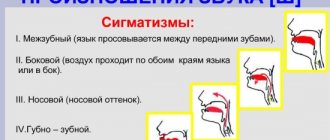At first glance, it may seem strange to have a desire to learn how to burr, but in some cases, this is a completely logical and necessary desire. It is clear that this property is useful for people studying foreign languages, French in particular. Sometimes it happens that you need to parody someone with such a defect. It’s quite possible to master this, the main thing is to try to work on yourself and your plans.
What is burr?
Burr is a speech defect in which the pronunciation of the sound “r” is impaired. Or rather, it is distorted, replaced by other sounds, or absent altogether.
The most difficult words for burry people are words with the letter “r”:
Instead of “r”, a burry person pronounces the sounds “g” (kran-kgan), “d” (red-kdasny), “l” (steam locomotive), “y” (fish-yyba), “v” (steep- kvutoy), “y” (lynx-yys) or skips completely (ruka-uka).
And I must say, this does not have the best effect on the quality of life due to emotional discomfort.
Why is this happening? Why do people burr?
Burr in adolescence
As you know, adolescence is one of the most difficult periods in life in terms of emotionality. A guy or girl who burrs often withdraws into himself and does not feel confident or supported by his peers. To get rid of this disease, you need to follow some rules:
- undergo regular medical examination by a dentist (once a year);
- carry out a set of exercises 3 times every day, this method is very effective in the fight against speech impediment;
- It is worth remembering that tasks must be completed before meals or an hour after eating.
Causes of burr
Burr speech can have different reasons:
- Atypical structure of the oral cavity, for example, insufficient length of the frenulum, protruding lower jaw, inert tongue. This disrupts the functioning of the articulatory apparatus and the person burrs at the letter “r”.
- Organic hearing impairment. Hearing loss leads to underdevelopment of the motor side of speech and incorrect pronunciation.
- Heredity. There is an opinion that there is a high probability of inheriting such a defect from parents.
- Psychological. As a result of severe stress or an unforeseen situation, a malfunction of the body may occur and the pronunciation of certain sounds may change.
- Social. If parents do not pay attention to how the child speaks and do not take timely measures to correct speech impairment, burr can remain with him for a long time.
French pronunciation
This language is very soft and melodic. The “r” sound in it has a pleasant burr. The Parisian version is the most difficult to pronounce.
But in provincial towns you can also find the familiar dialect with a hard “r”.
The main rule in reading French and the difference between the language and English and German is that the “r” at the end of a word is never lost and is pronounced the same way as at the beginning and middle. This sound belongs to the voiced and sonorant ones. But it is formed not like Russian - not in a large language, but in a small one. That is why it is called uvular.
According to the method of formation, the sound is fricative. This means that during pronunciation the vocal apparatus does not close, although it approaches quite strongly. Turbulent turbulence occurs in the mouth, which produces an audible result. The Paris version of this sound has no vibration or friction noise. It is completely slotted.
At the end of words in French, “r” can have up to 2 vibrations. There are several more pronunciation options in the regions. This is a rolling sound, similar to Russian and produced by the front of the tongue, but less vibrating and more sonorous. And graced, which is distinguished by its posterior lingual origin.
In addition to differences in the amount of vibration, noise in the sound is taken into account. This is especially important for Parisian pronunciation. And at the end of words, “r” becomes voiced and sonant, but not dull, as in the Russian sound.
Correct articulation in velar (classical) French pronunciation implies movement of the edge of the soft palate, less often the back surface of the tongue. In this case, the small tongue is in a tense state, but does not vibrate.
What to do if you burr?
A specialist who can really help cure burr and learn not to burr the letter “r” is a speech therapist. Professional knowledge is never superfluous. Moreover, rhotacism, also called burr, is a fairly common phenomenon among adults and children.
Proper sound production, working with the articulatory apparatus, speech therapy massage of the tongue, special exercises to correct burr - all this is in the arsenal of a professional specialist. And all this can give you back freedom in communication and pleasure from the sound of your own voice.
Seeing a speech therapist to unlearn how to burr is especially important for parents of children over 6 years old. Until this age, while the speech apparatus is developing, unclear pronunciation of the letter “r” is considered normal.
Correcting burr is also possible at home.
How to learn to burr
First of all, you need to start from your goals. Burrs in the French and German styles are very different, which means that the exercises need to be performed differently.
It's a completely different matter if you plan to burr in Russian. There are completely different rules here, and everything depends on the position of the speech apparatus. The speech therapist will tell you in more detail in the video below. There are 14 variations on how to burr the letter r.
Exercises to burr the letter r
There are special exercises developed by French teachers. With their help you will be able to pronounce the letter “P”.
- Stand in front of a mirror to see how your speech apparatus works. Press the middle of your tongue against the roof of your mouth and touch the tip of your tongue to your lower jaw. Try saying "r".
- With the base of your tongue, touch the roof of your mouth and pharynx, tighten it as much as possible. Pronounce the correct letter.
- Take a glass of water. Gargle while pronouncing the sound “r”. Remove water from the exercise and try to repeat the steps without it. The result should be a vibrating sound.
Do the exercises regularly and carefully monitor the results. Over time, you will notice changes, but be prepared that it will take time.
German pronunciation
There are three ways to say "r" in German. The pronunciation option depends on the letters in the spoken word. Such sounds are not found in Russian, so you will have to learn them from scratch.
- Looks like a slight burr. The sound is different from the soft French sound. After all, German is a rather tough language. The pronunciation is average between the Russian “r” sound and the Parisian one.
- Hissing "r". The letter has no analogues in the Russian language, but in pronunciation it resembles the soft “хь”. You need to pronounce this sound with a formed sharp exhalation, otherwise it will be hard to hear.
- The growling sound is very similar to Russian. Used only in the south of the country, especially popular in Bavaria.
To practice, you need to often listen to German speech and try to repeat the sound. There is no other way of learning.
If you want to learn German, we have an article on this topic.
French pronunciation
The language is soft and melodic, so in French you need to pronounce the letter “r” with a pleasant burr. You need to gradate the sound, as is customary in Paris.
In provincial towns, the usual dialect with the letter “r” is often used. So it’s not at all necessary to burr like a true Parisian if you’re just learning the language for tourist purposes.
The French language differs from German and English in that the letter “r” is read at the end of the word and is never lost.
When pronouncing, you do not need to close your lips tightly. Turbulent turbulence must be created in the mouth, with the help of which the desired sound is produced. In the Paris version there should be no vibration or friction noise, it should be completely slotted.
With correct articulation, movement of the edge of the soft palate, less often the back surface of the tongue, is implied. And the small tongue should be in a tense state, but not vibrate.
Listen and repeat
People are very good at imitation and repetition, and for this you need to constantly listen to burrs. You know exactly what you want to achieve, so choose a source of inspiration and listen to:
- French songs with a Parisian accent (for example, Edith Piaf with “Non, Je ne regrette rien” or Mireille Mathieu “La vie en rose”);
- speakers who clearly pronounce the grazing “r”;
- German speech with different variations of pronunciation;
- listening to tongue twisters in the desired language that contain the letter “r”;
- the speech of a burry person whose speech you like.
This is the easiest and most natural way to study burr. This is how children learn, which means learning is also suitable for adults.
Exercises for correct pronunciation
First you need to work on pronouncing the letter "r" simply. Later, move on to studying syllables and words. Indeed, depending on the location of the letter (beginning, end, middle), it varies.
The first thing you need to do is listen to words with different placements of “r”. Repeat after the announcer, then simultaneously, and then without him. Record your pronunciation on a voice recorder to hear yourself from the outside. Do it at least twice a day.
Choose a speech that is pleasant to listen to.
In addition, you can use the “mine” exercise. It is so named because the word “mine” must be pronounced while performing it. Repeat several times and watch the pronunciation of the “x” sound.
Remember the position of the larynx, and try to replace the dull sound with a voiced one. This is exactly what a graded “r” sounds like.
During further practice, make sure that there are no vibrations when pronouncing words with the letter “r” at the beginning or middle. It can only vibrate at the end.
Another quick way to learn to burr is to do a tongue exercise. Straighten it first and then tighten your backside. In this position, say “r” several times. At the same time, avoid vibrations and tension in the entire tongue - just the beginning.
Tongue Twisters
If you already know the language, you can memorize tongue twisters and sayings that contain many “r” letters. This way you will consolidate the skill and be able to bring the correct pronunciation to automaticity.
Some examples of suitable phrases:
- "Dans la gendarmerie, quand un gendarme rit, tous les gendarmes rient dans la gendarmerie."
- "Mon père est maire, mon frère est masseur."
- “Rat vit riz, Rat mit patte à ras, Rat mit patte à riz, Riz cuit patte à rat.”
First, pronounce them slowly, focusing on the pronunciation of the “r”. Later, increase your speed to communicate normally with the French.
How to cure burr yourself
In order to remove burr, you should:
- learn deep breathing using the diaphragm;
- perform special exercises for burring, aimed at developing the muscles of the tongue and lips.
Breathing technique
If you observe yourself, you can see that breathing is most directly involved in the pronunciation of sounds. Try to pronounce the sound “p” without breathing - it turns out to be an empty slap with your lips. The sound “p” appears only on exhalation.
The same is with the sound “r” - the deeper the breath and the stronger the exhalation, the brighter the “rrrrrr” sounds.
German pronunciation
There are three different ways to say “r” in German.
The choice of the right one depends on the specific word and the letters surrounding this sound. None of them are found in the Russian language, so you still need to learn how to pronounce them correctly. The first option sounds like a slight burr. The sound is not as soft as the French, since the German language is hard. This is something between Parisian and Russian pronunciation.
The second sound of “r” in German is hissing. It also has no analogues with Russian letters, but resembles a soft “хь”. In order for the sound to be heard, it must be pronounced with a forced, sharp exhalation.
The third way of pronunciation is growling. And he repeats Russian exactly. You can meet it not in all corners of the country, but in the south. This dialect is especially widespread in Bavaria.
Mechanics of sound reproduction
If a person wants to stop burring the letter P, he needs to understand how the sound is formed. To pronounce it you will need to relax your lips. It is important to monitor the position of your tongue. When speaking, it rises to the front teeth, located near their base. After this he actually rears up. If articulation is done correctly, the person can feel the vibration. You can check its presence in another way. To do this, place your finger where the lower jaw meets the neck. You need to contact a specialist if you cannot make a sound and there is no vibration.
In the dictionary Complete accentuated paradigm according to A. A. Zaliznya
burr, burr, burr, burr, burr, burr, burr, burr, burr, burr, burr, burr, burr, burr, burr, burr, burr, burr, burr, burr, burr, burr burr, burr, burr, burr, burr, burr, burr, burr, burr, burr, burr, burr, burr, burr, burr, burr, burr, burr, burr, burr, burr, burr, burr, burr , burr, burr, burr, burr, burr, burr, burr, burr, burr, burr, burr, burr, burr, burr, burr, burr, burr, burr, burr, burr, burr, burr, burr, burr, burr, burr, burr, burr, burr
Share the meaning of the word:
Music for learning grazing
A very good way to become a person who can burr is French music. Some artists even use too much grease to give their songs the most appeal. The music of such performers will be the best option for learning burry pronunciation.
Especially if a person knows how and loves to sing, then such an activity will bring a lot of pleasure and at the same time benefit. You just need to choose songs you like, which you can do online or by purchasing a CD of French music in a store.











